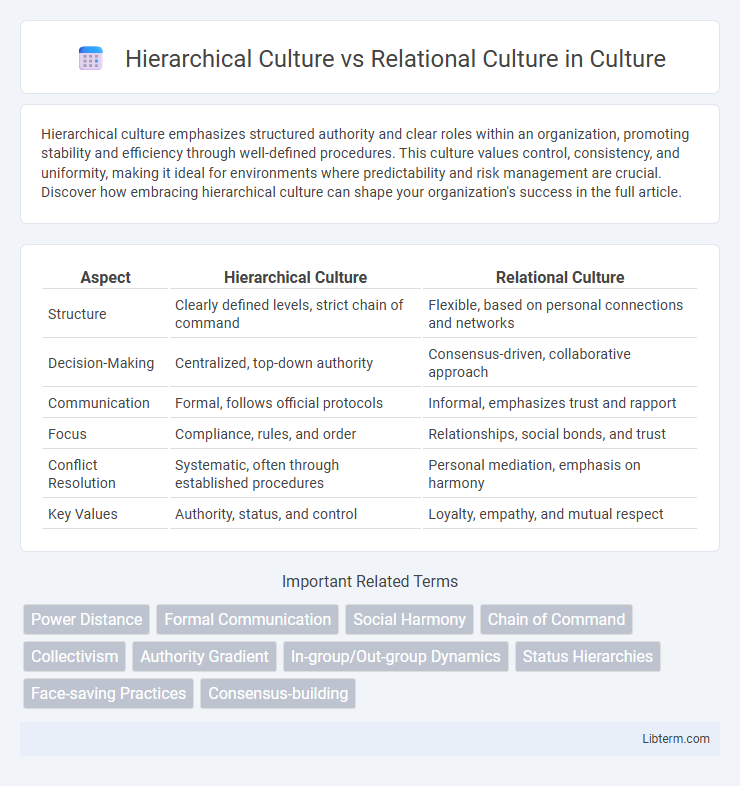Hierarchical culture emphasizes structured authority and clear roles within an organization, promoting stability and efficiency through well-defined procedures. This culture values control, consistency, and uniformity, making it ideal for environments where predictability and risk management are crucial. Discover how embracing hierarchical culture can shape your organization's success in the full article.
Table of Comparison
| Aspect | Hierarchical Culture | Relational Culture |
|---|---|---|
| Structure | Clearly defined levels, strict chain of command | Flexible, based on personal connections and networks |
| Decision-Making | Centralized, top-down authority | Consensus-driven, collaborative approach |
| Communication | Formal, follows official protocols | Informal, emphasizes trust and rapport |
| Focus | Compliance, rules, and order | Relationships, social bonds, and trust |
| Conflict Resolution | Systematic, often through established procedures | Personal mediation, emphasis on harmony |
| Key Values | Authority, status, and control | Loyalty, empathy, and mutual respect |
Understanding Hierarchical and Relational Cultures
Hierarchical culture emphasizes structured authority, clear roles, and formal rules to maintain order and efficiency within organizations or societies. Relational culture prioritizes interpersonal relationships, trust, and collaboration, fostering a sense of community and social harmony. Understanding these cultural dimensions helps in navigating communication styles, decision-making processes, and conflict resolution in diverse environments.
Key Characteristics of Hierarchical Culture
Hierarchical culture emphasizes a clear chain of command, formalized roles, and structured procedures to maintain order and control within an organization. Decision-making is typically centralized, with authority concentrated at the top levels of management to ensure consistency and predictability. Employees in hierarchical cultures often follow established protocols and respect organizational rank, fostering stability and efficiency but potentially limiting flexibility and innovation.
Defining Traits of Relational Culture
Relational culture emphasizes interpersonal connections, mutual trust, and collaborative decision-making, contrasting with the authoritative structure of hierarchical culture. It prioritizes emotional intelligence, open communication, and shared values to foster a supportive environment where individuals feel valued and engaged. This culture thrives on flexibility, empathy, and collective responsibility, enhancing team cohesion and innovation.
Leadership Styles: Hierarchical vs Relational
Hierarchical culture leadership emphasizes formal authority, clear chains of command, and top-down decision-making, often prioritizing stability and control within organizations. Relational culture leadership focuses on building strong interpersonal connections, collaboration, and empowering team members to foster trust and collective engagement. Leadership in hierarchical settings tends to be directive and control-oriented, whereas in relational cultures, it is inclusive, empathetic, and participative.
Communication Patterns in Both Cultures
Hierarchical culture communication emphasizes formal channels, clear authority lines, and structured information flow, where messages often follow a top-down approach and maintain respect for rank. Relational culture communication prioritizes interpersonal connections, open dialogue, and collaborative exchanges, fostering trust through informal, empathetic interactions. Understanding these patterns can improve cross-cultural communication effectiveness by adapting messaging style to either authority-driven or relationship-oriented contexts.
Decision-Making Processes Compared
Hierarchical cultures emphasize top-down decision-making, where authority rests with senior leaders and decisions follow strict protocols to maintain order and control. Relational cultures prioritize consensus and group harmony, encouraging collaborative decision-making that involves input from multiple stakeholders to build trust and long-term relationships. This contrast impacts organizational agility, with hierarchical structures often faster but less flexible, while relational approaches foster sustainability through inclusive deliberation.
Conflict Resolution Approaches
Hierarchical cultures approach conflict resolution with a focus on maintaining authority and structured decision-making, often relying on top-down mediation to restore order. Relational cultures prioritize harmony and interpersonal relationships, using empathetic dialogue and consensus-building to resolve conflicts. The contrasting methods highlight power dynamics in hierarchical settings versus emotional connectivity in relational approaches.
Impact on Employee Engagement and Motivation
Hierarchical culture emphasizes structured roles and clear authority, which can lead to predictable workflows but may restrict employee autonomy and reduce intrinsic motivation. Relational culture fosters strong interpersonal connections and collaboration, significantly enhancing employee engagement by promoting trust and a sense of belonging. Organizations prioritizing relational culture often experience higher motivation levels, as employees feel valued and empowered to contribute creatively.
Organizational Outcomes and Effectiveness
Hierarchical culture emphasizes structure, formal authority, and clear roles, often leading to efficient decision-making and consistent operational outcomes but may limit creativity and employee engagement. Relational culture, centered on collaboration, trust, and interpersonal relationships, enhances communication, innovation, and employee satisfaction, driving adaptive and flexible organizational effectiveness. Organizations balancing hierarchical clarity with relational support achieve optimized performance, leveraging stability and agility for superior outcomes.
Choosing the Right Culture for Your Organization
Choosing the right culture for your organization requires evaluating the structure and communication style that best align with business goals and employee dynamics. Hierarchical culture emphasizes clear authority lines and formal procedures, ideal for large, regulated industries needing stability and consistency. Relational culture prioritizes collaboration and flexibility, fostering innovation and employee engagement in dynamic, creative, or startup environments.
Hierarchical Culture Infographic

 libterm.com
libterm.com